
Discover Your Ancestors
Two critically acclaimed publications are available to family history researchers - the annual print magazine, Discover Your Ancestors, and the monthly online magazine, Discover Your Ancestors Periodical. Click here to subscribe.Plimsoll’s line
Nick Thorne explores the life of Samuel Plimsoll, from bankrupt coal merchant to renegade MP
Samuel Plimsoll, the Liberal MP remembered for the Plimsoll line on merchant ships, was born in Bristol on 10 February 1824. The son of Thomas Plimsoll, a supervisor of excise, and Priscilla Willing, his family moved to Penrith in Cumberland when he was very young and then to Sheffield.
It was his concern for the ordinary seamen on overloaded vessels and his fight in Parliament that led to the adoption of the Plimsoll line, used on merchant ships to this day. Because he was born before the introduction of civil registration (in 1837) he doesn’t appear in the GRO records. We can, however, get some clues about where and when he was born from the census – but we have to be vigilant not to be thrown off track by an entry that is not quite correct. In Samuel’s case the 1861 London census listed him as having been born in Penrith, when this was simply the town where he grew up.
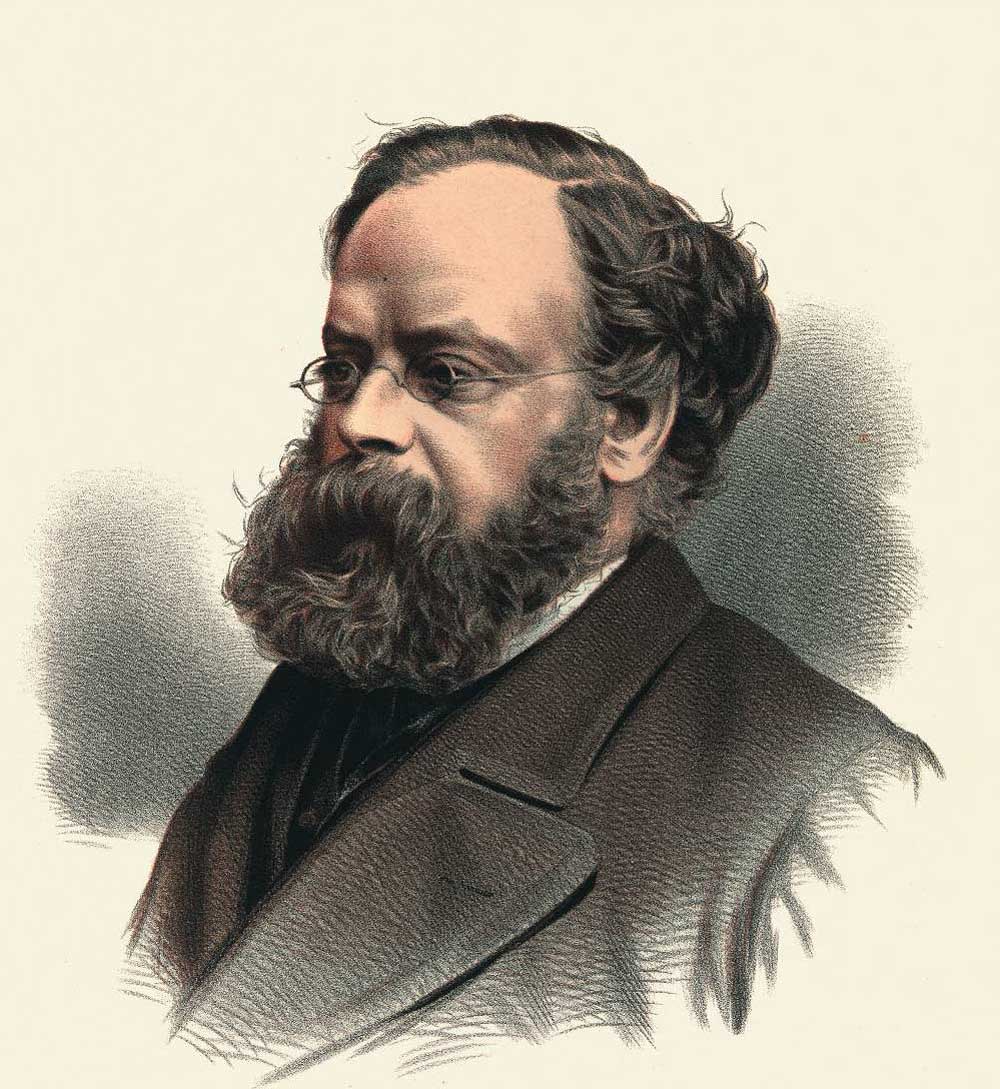
Viewing the 1851 census of Sheffield we find he is recorded as having been born in Bristol, which matches other resources that we shall look at later. Possibly the enumerator in the 1861 census may have entered the details supplied by another member of the household who didn’t recall it correctly. His family were Nonconformists and we can trace the baptisms of several of his siblings in the Nonconformist registers on TheGenealogist. These reveals baptisms in several different parts of the country and point to his father’s occupation taking him from Devon to Bristol and then to Cumberland in the North of England. Samuel’s elder sister Ellen, for example, was baptised in Woolborough, Devon in 1818.
By investigating Samuel’s brother Henry, born 8 August 1828, we can deduce the date of the move north to Cumberland to have been between August 1828 and May 1829; while Henry Plimsoll was born in Bristol, his baptism was held in Penrith in May 1829.
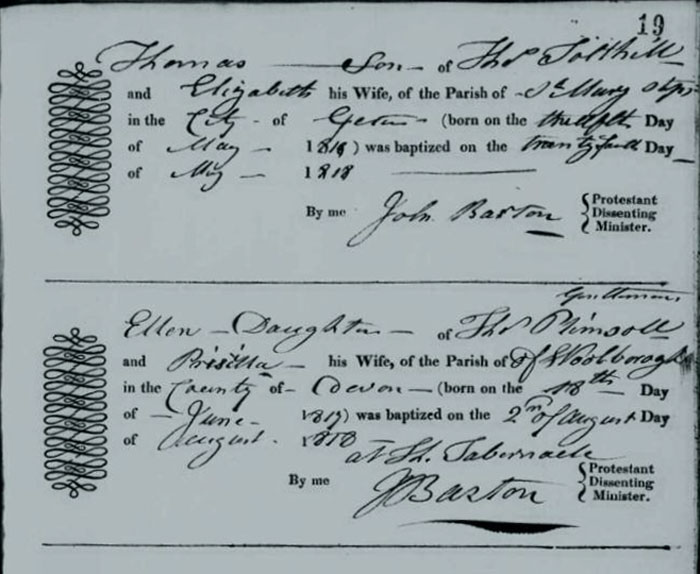
Nonconformist records on TheGenealogist reveal Samuel’s sister was baptised in Devon on 2 August 1818

Henry Davison Plimsoll born 1828 in Bristol, baptised 1829 in Penrith, found in the Nonconformist records on TheGenealogist
The 1841 census reveals that the large family were now living in Regent Street, Sheffield, having moved yet again. In the next census, in 1851, Samuel's father is nowhere to be seen. Priscilla is now the head of the family and is recorded as being the proprietor of houses – and here it is revealed that Samuel had been born in Bristol. By 1861 he had married Eliza and moved to London and we are able to discover using the marriage records on TheGenealogist that he had married Eliza Ann Railton in the Wortley area of the West Riding of Yorkshire in 1857.
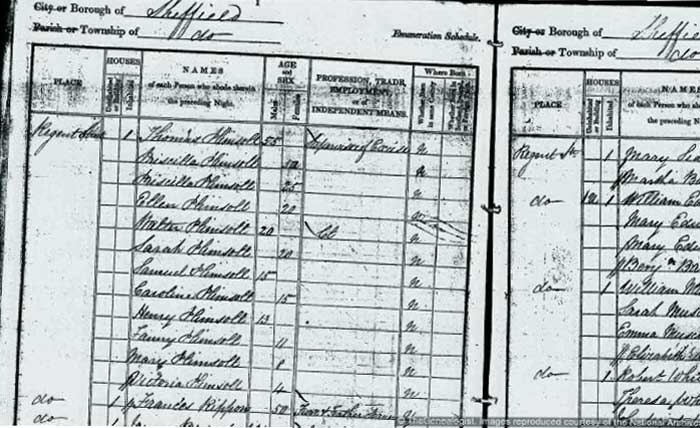
1841 Census of Sheffield
Bankrupt
Plimsoll had become involved in shipping coal to London before his marriage. His business, unfortunately, went bankrupt and there was a period of hardship when he resorted to living in the cheap model lodging houses for working men that had been established by Lord Shaftesbury. We can read this information in an extract from his book Our Seamen quoted in The Illustrated London News of 22 March 1873 on TheGenealogist. This period probably had a bearing on his affinity with the Liberal party and why he then entered politics. Samuel Plimsoll became an expert in the trading of coal and wrote several publications on the subject. The 1861 census, on TheGenealogist, shows us that he was once again a coal merchant and was living at 9 Harrington Square in Marylebone. Turning to Kelly’s Post Office Directory for 1859 we see that, in that year, his business was situated at 32 Hatton Gardens, which is off Holborn Hill in London.
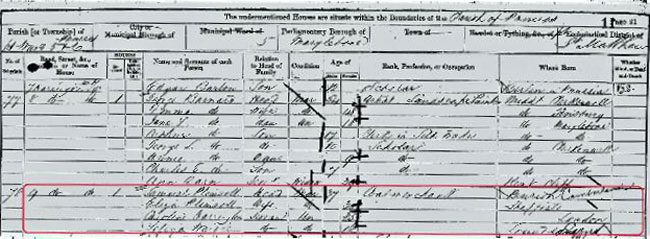
1861 Census on TheGenealogist
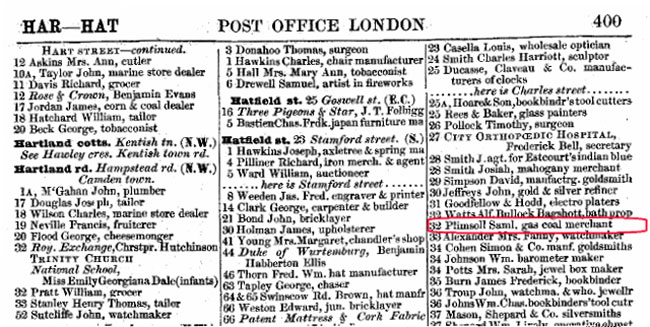
Samuel Plimsoll the gas coal merchant at 32 Hatton Garden in Kelly’s Post Office Directory of 1859
Elected to parliament
Samuel was elected to parliament as a Liberal MP in the 1868 general election. Thoms British Directory 1873, on TheGenealogist, reveals his seat was for Derby and also provides us with the name of his father-in-law and so enables us to begin investigating Eliza Ann’s line.

Thom’s British Directory 1873 lists Samuel Plimsoll as MP for Derby
Using the Newspaper and Magazine resource on TheGenealogist we can find an article from 7 August 1875 in The Illustrated London News that provides us with a great deal of background information including that the Plimsoll family were descended from Huguenot stock. The piece reveals to us that Samuel had started his working life as a clerk in a Sheffield solicitor’s office, having been the recipient of a better education than may have been expected of the son of man with limited means. From this article we are given a date for Samuel’s marriage in 1857 and provides us with the detail that Eliza Ann’s father was of Barnard Castle, so helping us to identify that the Railtons came from County Durham.
Searching the tithe records and maps on TheGenealogist provides us with a plot of land surveyed in 1840 for a Hugh Railton in Barnard Castle which could be a line to investigated further. There is also a confectioner living in Barnard Castle whose name is Hugh Railton and appears in the census up to 1881, but he is not likely to be Eliza’s father as by 1851 Eliza Ann was living in her step father’s household. On the image of the census page we can read that she and her sister’s relationship to John Chambers was that of daughter in law – at this time ‘daughter in law’ would apply to stepdaughters as well as to the wives of the children of the head of the household. John Chambers was an iron maker with a business that included coal pits and with his help Samuel re-established himself, after his bankruptcy, and through Chambers he met his future wife.
Unparliamentary Language
A piece published in The Illustrated London News in August 1875 tells us that Our Seamen was Samuel Plimsoll’s most remarkable book. As an MP he took up their cause for better protection from unscrupulous ship owners who dangerously overloaded their boats. An intriguing tease in the article refers to “the recent phases of this controversy being well known to every newspaper reader”. A more comprehensive search of the newspaper and magazines on TheGenealogist finds more mentions of the MP. Two years earlier, we read about Samuel Plimsoll holding public meetings to gain support for his campaign and he achieves the appointment of a Royal Commission in 1873. In 1875 a government bill is introduced to Parliament that Plimsoll considers to be inadequate but, nonetheless, he resolves to accept. Disappointingly for him the Prime Minister, Benjamin Disraeli, then has a change of heart and announced that the bill would be dropped. Samuel was furious and lost his self-control, using unparliamentary language by calling members of the house ‘villains’ and shaking his fist in the Speaker's face. Disraeli moved that the MP be reprimanded but on the suggestion of Lord Hartington agreed to adjourn the matter for a week to allow the member for Derby time for thought. Samuel apologised to the house, but found that many people shared his view that the bill had been suppressed by vested interest in the form of the shipowners, some of whom even sat in the Commons. This, then, was the matter that the newspaper was referring to. Popular support from the population eventually forced the government to pass a bill which in the following year was written into the Merchant Shipping Act. Now the Board of Trade had stringent powers to inspect ships and there was a requirement for the Plimsoll line to be painted on vessels to indicate the safe limit to which a ship may be loaded.
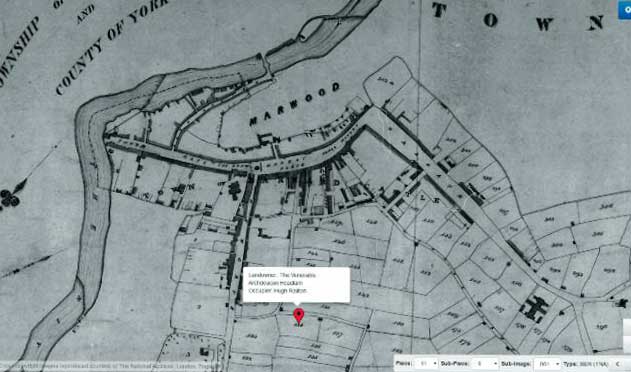
Tithe record for Barnard Castle, 1840
The 1871 census allows us to gain a bit more knowledge about Samuel and his wife. In this year they were enumerated in Hastings where the MP is recorded as being blind in the right eye and deaf in the left ear, as he is again in the 1891 census. The household stretches onto the next page where two sisters are recorded as well as Ellen MA Plimsoll who was their “adopted daughter and the daughter of their deceased nephew”. They had no surviving biological children from their marriage and Eliza Ann would sadly die on a trip to Australia in 1882. Samuel married for a second time, in 1885, to the daughter of another MP and we can find that marriage in the GRO records using TheGenealogist.

1871 census on TheGenealogist
The second Mrs Plimsoll was Harriet Frankish Wade, with whom he had several children including a son called Samuel Richard Cobden Plimsoll, whom we can also go on to trace in the records on TheGenealogist. Their son appears several times in the Military collection where we can see that he had been mentioned in despatches, awarded campaign medals and features in the casualty lists several times. First he is recorded as wounded in April 1916, then in July 1918 he was documented in the daily Casualty Lists as ‘Previously reported missing, believed killed, now reported prisoner In German hands’.
The educational records on TheGenealogist furnishes us with Samuel Plimsoll Jnr’s entry in the Balliol College Register. This provides other details such as the award of an MC and bar in 1917, his position as the Superintendent of Middlesex Hospital in 1928 and that his wife was Enid, daughter of Arthur Ramsden.

The Balliol College Register from the educational records on TheGenealogist